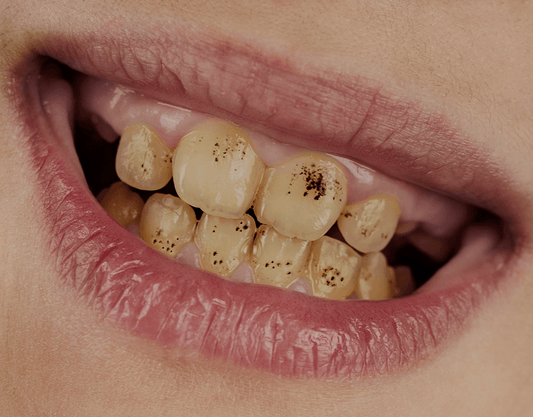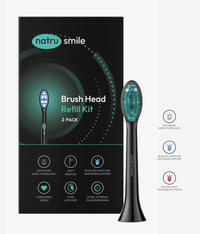
All products are certified by dental expert Dr. Greg Grillo
Have you ever noticed a black dot on your tooth and wondered what could be the reason behind it? Oral health issues often lead to unsightly tooth discoloration or stains that leave you feeling self-conscious.
Whether it's a small black dot on your tooth or a larger one, it is essential to understand the root of the problem and seek proper treatment promptly to prevent further complications. In this comprehensive guide, we'll examine the causes of tiny black or brown dots on teeth, evaluate the different treatment options available, and provide additional insights into preventing and addressing these dental issues, making it easier for you to make an informed decision when it comes to your oral health.
Get ready to embark on a journey to better understand the mystery of black dots on teeth and learn about the measures you should take to keep your smile bright and healthy!
What Causes A Black Or Dark Dot On Your Tooth? Exploring Different Factors
A dark or black dot on your tooth might be an alarming sight, but there are many reasons it occurs, ranging from harmless to more serious issues. We've compiled a list of common explanations below to help understand the possible causes:
Tooth Decay Or A Cavity
Tooth decay is one of the most frequent causes of small black dots on teeth. When bacteria build up on your teeth, they produce acids that eat away at the tooth's enamel. Enamel is the outer protective layer, and when it begins to break down due to bacteria proliferation, this weakens the tooth structure, ultimately leading to a cavity or hole in the tooth. This cavity or hole may appear as a black dot that you'd want to keep an eye on and seek dental attention for.
An Injury To The Affected Tooth
Physical injuries, such as a fall, a blow to the face, or other accidents, have lasting impacts on your teeth's health. An injury results in damage to the tooth's internal structure (pulp), leading to inflammation and the eventual death of the blood vessels and nerves within the tooth. This process takes several months or even years, and the affected tooth may gradually change to a darker color. In some instances, a dark dot, brown dot, or even a black dot on the tooth may be triggered by trauma.
Tartar Buildup On The Tooth
Tartar, or calculus, is a hardened form of dental plaque. It results from the mineralization of dental plaque when not removed through regular brushing and flossing. If left untreated, black tartar on teeth causes rapidly worsening (and permanent) dark spots, usually near the gumline. Poor oral hygiene exacerbates tartar buildup, leading to more obvious discoloration on the tooth's surface.
Medical Conditions And Treatments
Certain medical conditions, such as anemia or celiac disease, have adverse effects on your dental health, including causing enamel defects and black dots on teeth. Treatments like chemotherapy or radiation also cause discoloration and contribute to these dark spots. Sometimes, the black dot on your tooth could be a more severe issue called amelogenesis imperfecta, which is a rare genetic disorder affecting the formation of tooth enamel.
In the following section, we will discuss various treatment options to help you tackle the issue of black or dark dots on your teeth.
How To Get Rid Of Black Or Brown Dots On Teeth: Detailed Treatment Approaches
Once you've determined the exact cause of the black dot on your tooth, there are various ways to address the issue. Let's look at some of the most common and effective methods for treating black or brown dots on teeth.
Dental Prophylaxis: Professional Dental Cleaning
A professional dental cleaning, also known as dental prophylaxis, removes tartar buildup and stains, making it an effective solution for addressing black dots formed by tartar. During this non-invasive procedure, a dental hygienist uses ultrasonic devices and manual hand instruments to gently remove the hardened deposits from your teeth.
Tooth Whitening Pastes Or Powders: DIY And Natural Home Remedies
At-home teeth whitening treatments, including natural teeth whitening pastes and powders, are a popular option for removing external stains on your teeth. Using over-the-counter products or making homemade remedies, you will conveniently whiten your teeth without a visit to the dentist. Always follow your dentist's recommendation and use toothpaste containing fluoride to maintain good oral health. It's essential to choose a product that won't harm your tooth enamel, and seek professional advice if you're unsure about the efficacy and safety of a particular product.
Dental Veneers: Aesthetic Solution To Enhance Your Smile
In some cases, dental veneers are used to mask the discoloration and improve your smile. This method involves placing a thin layer of porcelain or dental composite material on your tooth's surface to improve its appearance. Veneers are custom-made to fit your teeth seamlessly and are bonded using a strong dental adhesive to ensure a long-lasting result.
Keep in mind that veneers are a more expensive remedy, with the veneer cost being much higher than some other teeth whitening options. However, the final result is a flawless smile that looks natural and visually appealing.
When considering the best treatment option for black or brown dots on your teeth, always consult with a dental professional to ensure the most suitable and effective method is chosen.
How to Prevent Dark Or Black Dots On Your Teeth: Comprehensive Advice
Discovering how to avoid dark or black dots on your teeth is crucial for maintaining a bright, healthy smile. Here are some valuable and in-depth tips that will help you prevent these unsightly spots:
Maintain Excellent Oral Hygiene
A fundamental step to avoiding dark dots on your teeth is practicing good oral hygiene. This involves brushing your teeth at least twice a day, using a fluoride-containing toothpaste, and flossing daily to help eliminate plaque buildup and prevent the accumulation of harmful bacteria in your mouth.
Brush Your Teeth After Eating
Brushing your teeth after every meal or snack is an exceptional preventative measure because it minimizes the chances of bacteria and lingering food particles contributing to dark or black spots on your teeth. If it's not feasible to brush immediately after eating, at least rinse your mouth with water to help remove food debris.
Use Mouthwash Regularly
Using a high-quality, antibacterial mouthwash will aid in preventing black dots by further eliminating harmful bacteria and reducing plaque buildup. Incorporate mouthwash into your daily routine to enhance your oral hygiene regimen.
Be Conscious Of Your Diet
Avoiding excessive consumption of dark-colored foods and beverages, such as coffee, tea, red wine, and berries, helps minimize the risk of developing dark or black spots on your teeth. Additionally, consume a balanced diet rich in fruits, vegetables, and dairy products to promote strong teeth and healthy gums.
Stop Consuming Tobacco Products
Tobacco use is a significant contributor to various dental issues, including black lines on teeth, stains, and tartar on teeth. To prevent these unappealing marks, it's essential to quit smoking and discontinue the use of other tobacco products. This decision will improve not only your oral health but your overall well-being as well.
Seek Routine Dental Checkups And Cleanings
Scheduling regular dental checkups and professional cleanings play a pivotal role in preventing black dots on your teeth. Dentists and hygienists detect early signs of discoloration and address minor issues before they escalate.
Consider Professional Teeth Whitening
Professional teeth whitening may be an effective solution if you're dealing with stubborn black stains on teeth or severe discoloration. This process entails using a potent bleaching agent under the careful supervision of a dentist. Although the cost of home teeth whitening kits may be lower, the expertise of a dental professional and access to specialized tools make professional whitening treatments a more viable and reliable option for longer-lasting results.
Wrapping Up
In conclusion, a black dot on your tooth could be a result of various factors such as tooth decay, injury, or even an underlying medical condition. The key to addressing this issue lies in accurately identifying the cause and exploring suitable treatment options tailored to your specific needs. As always, consulting with a dentist for personalized advice is the best way to ensure a healthy smile and proper dental care.
Now that you know a lot of general information about black dots on your teeth, here are some answers to a few specific questions you might have.
Why Is There A Tiny Black Dot On My Tooth?
A tiny black dot on your tooth could be attributed to several factors, including tooth decay, tartar buildup, or even an injury. It is important to consult a dentist to determine the precise cause and the most appropriate action to address this issue.
Does A Black Dot On A Tooth Mean A Cavity?
While a black dot on a tooth may be suggestive of a cavity or tooth decay, it's essential to note that other factors, such as tartar buildup or an injury, may also lead to black dots on teeth. Seeking a professional dental consultation for a proper evaluation and diagnosis is key.
How Can I Remove Black Spots On My Teeth?
Various treatment options are available to remove black spots on teeth, including dental prophylaxis (professional teeth cleaning), at-home or professional teeth whitening procedures, and dental veneers. Your dentist will be able to recommend the ideal treatment course depending on the cause and severity of the black spots on your teeth.
How Can Tartar Buildup Lead To Black Spots On Teeth?
Tartar buildup on teeth can create a rough surface that accumulates bacteria and stains, leading to black spots or discoloration on the tooth's surface. This type of black spot is typically removable through dental cleaning procedures.
Can Smoking Cause Black Spots On Teeth?
Yes, smoking is a common cause of black spots on teeth due to the nicotine and tar present in cigarettes. These substances can stain teeth and cause black spots or discoloration. Quitting smoking and seeking professional dental treatment can help to remove these spots.
Are Black Spots On Baby Teeth Normal?
Black spots on baby teeth may indicate tooth decay, which is not uncommon in young children. It's important to take care of baby teeth as they serve as placeholders for adult teeth. Consulting a pediatric dentist can help address any issues and prevent further decay.
Can Poor Oral Hygiene Cause Black Spots On Teeth?
Yes, poor oral hygiene can lead to black spots on teeth. When plaque and bacteria build up on teeth, they can cause tooth decay and discoloration. Practicing good oral hygiene habits, such as brushing and flossing regularly, can help prevent black spots from forming on teeth.
Can Medications Cause Black Spots On Teeth?
Yes, certain medications can cause black spots on teeth as a side effect. For example, some antibiotics, such as tetracycline, can cause discoloration or black spots on teeth if taken during childhood when the teeth are still developing. It's essential to discuss any medication-related concerns with your dentist or physician.
Can I Remove Black Or Dark Dots On Teeth At Home?
Home remedies and teeth whitening products exist, such as whitening toothpaste, for reducing the appearance of black or dark spots on teeth. However, it is crucial to first identify the underlying cause of the black dot before attempting any at-home treatments. Consulting a dentist for a tailored treatment plan will ensure you achieve the desired results without compromising your dental health.
In summary, always prioritize seeking advice from a dental professional if you notice any abnormalities in your oral health, including black gums or black triangles between teeth. This will enable you to access the appropriate care and maintain a bright and healthy smile.












